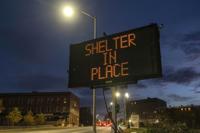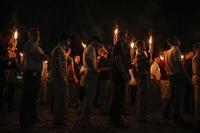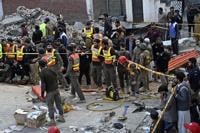PORTLAND, Maine (AP) — Across the nation, much of the debate around gun rights and restrictions centers on mental health. Many advocates on both sides agree that getting people with serious mental health struggles into treatment, and preventing people who are dangerous from accessing guns, is key to preventing mass shootings.
Yet in the before the , there were so many warning signs from the killer that people all around him were to authorities. He was still able to massacre 18 people, wound another 13 and shatter a community's .
Lawmakers want answers as to why laws in two states — Maine and New York — didn’t prevent the tragedy.
“It’s a massive failure,” said Republican state Sen. Lisa Keim, sponsor of Maine’s so-called “yellow flag” law. “This one, it seems that there were too many touchpoints for neither law to come into play.”
The law in Maine, a state that is staunchly protective of gun rights, requires more hurdles than “ ” laws in more than 20 states, including New York. Also known as extreme risk protection orders, they generally allow family members or police to ask a judge to temporarily keep guns away from someone who presents a danger to themselves or other people, said Allison Anderman of the Giffords Law Center to Prevent Gun Violence.
Maine's requirement of a medical evaluation adds an extra hurdle, especially in cases where people are acting dangerously but don't have a diagnosed mental illness, Anderman said. “They’re really very different laws,” she said.
Keim, meanwhile, said “yellow flag” law process can begin with a phone call and noted it has been successfully invoked 82 times since taking effect in 2020.
Leroy Walker, whose in the shootings, said he’s pleased Maine's governor is bringing together an independent panel of experts “to find how out how this slipped through the cracks and we ended up losing 18 beautiful lives.”
The Auburn city councilor said he’s not ready to point fingers, but feels frustrated to learn from news outlets about the missed opportunities, including those under red and yellow flag laws.
“None of ’em worked. We definitely need to go back and figure out where these mistakes were made,” Walker said.
Behind the Oct. 25 tragedy is a confusing web of federal and state laws.
Under Maine’s yellow flag law, a warning to police can trigger a process where an officer visits an individual and makes a judgment call on whether that person should be placed in temporary protective custody, in turn triggering assessments that with a judge’s approval can lead to a 14-day weapons restriction. A full court hearing could lead to an extension of restrictions for up to a year.
There were plenty of warnings that Card might snap.
During military training in New York, he said people were accusing him of being a pedophile. He pushed one reservist and locked himself in his motel room, leading commanders to take him to the base hospital. From there, he was taken to a private mental health facility where he was hospitalized for 14 days. His military weapons were taken away.
Maine officials say they were unaware of any alerts from officials in New York. And it's unclear if there was any effort to invoke New York's red flag law while he was in the state.
Army spokesperson Lt. Col. Ruth Castro said she couldn’t tell The Associated Press whether Card was committed to a psychiatric facility on his own free will or involuntarily because of a federal health privacy law. She said the same law prevented her from saying what Card’s diagnosis was after he was evaluated.
She denied requests to answer other questions about what the Army did or did not do to inform others of Card’s condition, citing ongoing law enforcement investigations.
Back in Maine, reservists kept voicing their worries about Card after he returned in early August. Family members told a deputy that his mental health deterioration had begun in January, and his ex-wife and son had alerted police in Maine that Card was angry and paranoid, as well as heavily armed with 10-15 guns he’d taken from his brother’s home.
People can be legally barred from having guns for a few reasons, including felony convictions and domestic-violence protection orders. But whatever the reason, removing guns a person already has is often complicated, said Anderman, the senior counsel at the gun violence law center.
“Most states do not have adequate relinquishment provisions for when people become prohibited,” she said.
A commitment to a mental-health facility also bars people from having guns under federal law, but that measure doesn’t have a mechanism to take away any weapons a person already has. And although Card was treated at a facility, the FBI says nothing was entered into the federal background check system that would have prevented him from buying weapons.
In a text early on Sept. 15, one of Card’s fellow reservists urged a superior to change the passcode to the gate and have a gun if Card arrived at the Army Reserve drill center in Saco. The reservist said Card refused to get help for his mental illness “and yes, he still has all his weapons.”
“I believe he’s going to snap and do a mass shooting,” the reservist wrote.
That was the same day a deputy went to Card’s home in Bowdoin, but no one was home. The deputy returned the following day and heard noises inside but Card didn’t answer the door. The deputy called for backup, but they eventually left.
The sheriff said his deputies didn’t have legal authority to break down the door and take Card, and there’s no indication the deputy ever spoke to him — the first step to triggering the yellow card law.
The sheriff’s office canceled its statewide alert seeking help locating Card, who they described as “armed and dangerous,” a week before Lewiston became the 36th in the United States this year.
___
Whitehurst reported from Washington, D.C. Associated Press writer Bernard Condon contributed from New York.














































